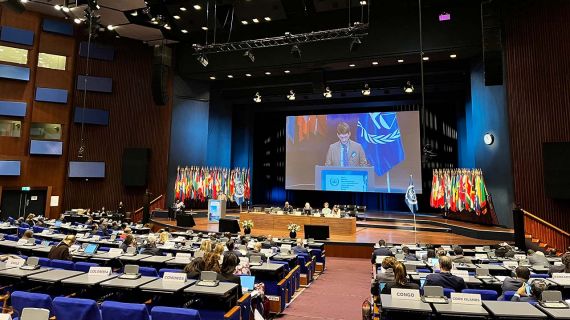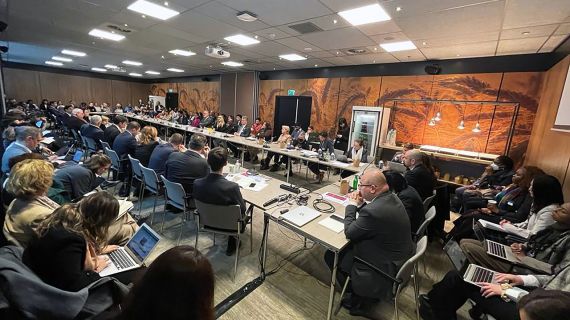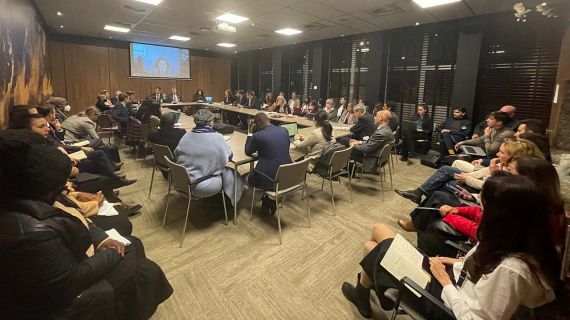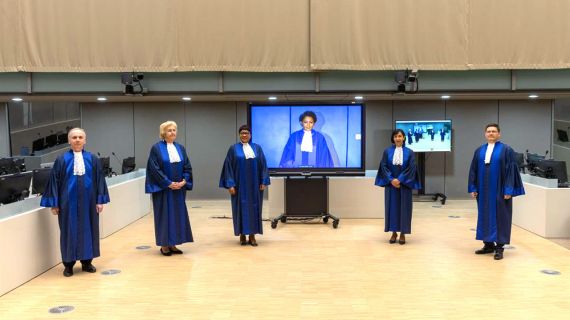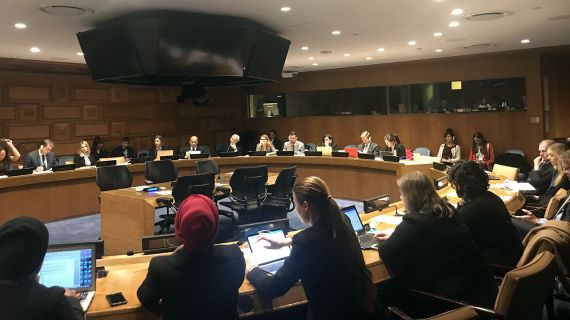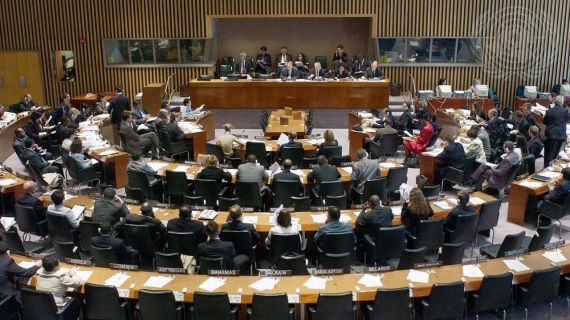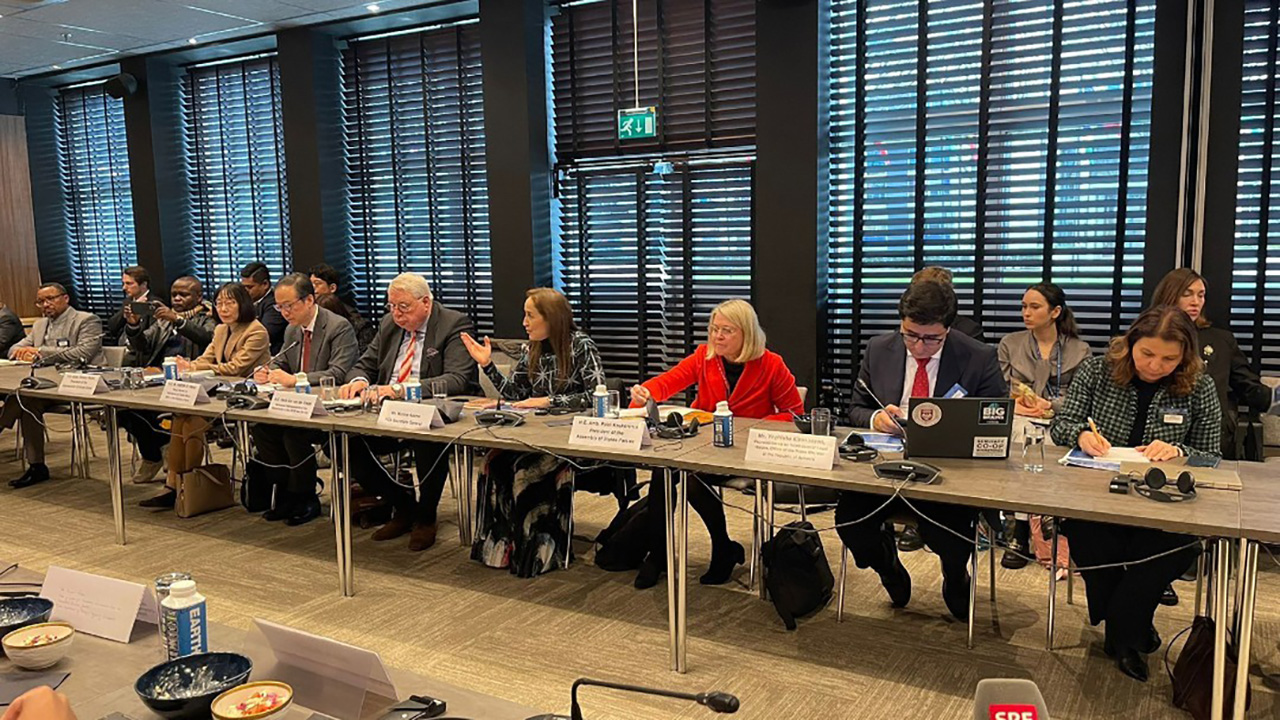
From 2-6 December 2024, the 23rd Session of the Assembly of States Parties (ASP) to the Rome Statute of the International Criminal Court (ICC) convened in The Hague, the Netherlands. This annual event gathered States, international organizations, and civil society to discuss the ICC's budget, cooperation, complementarity, and management challenges. It took place amidst unprecedented and complex challenges that threaten the Court's existence, underscoring the urgent need for collective action to support the ICC’s independence and promote international justice. PGA facilitated the participation of Hon. Julieta Kavetuna, MP (Namibia), and a delegation of parliamentarians from the Senate and the National Assembly of the Democratic Republic of the Congo in this year’s session.
Highlights from the ASP
The General Debate highlighted the necessity for States Parties to commit towards accountability and universality and the importance of domestic implementation of the Rome Statute. Participants recalled that cooperation with the ICC is essential to prevent safe havens for perpetrators and secure justice for survivors and victims. Discussions on the Special Session on the review of the amendments on the crime of aggression, scheduled for July 2025, emphasized the need to harmonize the crime of aggression under the jurisdictional regime of the Rome Statute with the three other core crimes.
States warmly welcomed the participation of Armenia and Ukraine, representing a significant milestone for universality. The Assembly marked Armenia's first official participation as the 124th State Party to the ICC, while Ukraine participated for the first time since depositing the ratification instrument in October 2024. Ukraine will officially become the 125th State Party to the ICC on 1 January 2025.
Civil society organizations (CSOs) also played a vital role throughout the week, raising awareness of the serious threats to justice and the immense challenges faced by human rights defenders cooperating with the Court. They called for concrete measures to ensure States’ support and address menaces, such as cyberattacks and sanctions, as well as the Court’s limited resources, while recalling the need to ensure the meaningful participation of survivors and communities of victims. CSOs also reiterated the legal obligation of States Parties to cooperate with the Court, accomplished through the adoption of effective cooperation legislation.
At the conclusion of the ASP, participants unanimously adopted six resolutions focused on strengthening the ICC, implementing a tenure policy, imposing a moratorium on recruiting ICC staff from non-State Parties, reviewing the ICC and the Rome Statute system, enhancing cooperation, and approving the 2025 programme budget which, with the increase of approximately 6,53%, did not meet the proposal by the ICC of 10.4%.
Highlights from PGA’s side event on Universality
Numerous side events enriched the ASP discussions, highlighting specific situations or themes related to upholding international justice. PGA, the Coalition for the International Criminal Court (CICC), the Netherlands, the Republic of Korea, Liechtenstein, and Switzerland, co-hosted a side event on 3 December 2024 titled “The Universality of the Rome Statute System,” which explored strategies to promote the ratification and domestic implementation of the Rome Statute and its amendments.
In light of the threats faced by the Court, H.E. Henk Cor van der Kwast, Permanent Representative of the Netherlands to the Organisation for the Prohibition of Chemical Weapons and the ICC and H.E. Ki Hwan Kweon, Deputy Minister for Multilateral and Global Affairs of the Republic of Korea, emphasized the need for universal ratification to strengthen the ICC’s legitimacy and effectiveness. They specifically called for increased ratification efforts in the Asia-Pacific region and urged all States Parties to ratify the Agreement on Privileges and Immunities (APIC), a fundamental instrument for the ICC to carry out its mandate independently and effectively.
The ICC President, H.E. Judge Tomoko Akane, and the ASP President, H.E. Ambassador Päivi Kaukoranta, both reiterated the need for increased ratification to put an end to the ICC’s limitations to intervene in certain situations and ensure that its mandate is geographically inclusive. They also highlighted the importance of visibility and outreach to foster global support and cooperation.
Ms. Myroslava Krasnoborova, Eurojust Liaison Prosecutor for Ukraine, and Mr. Arie Mora, Communications and Advocacy Manager and Legal Analyst at the Ukrainian Legal Advisory Group (ULAG), touched upon the challenging yet ultimately successful journey Ukraine undertook to achieve the ratification. Ukrainian and international CSOs, including PGA, played a crucial role in overcoming obstacles by engaging multiple stakeholders and mobilizing public opinion. International diplomacy provided valuable support, the ICC played an active role in the country, and parliamentarians committed to pursuing ratification. However, as Mr. Mora recalled, ratification is only the beginning. Ukraine must fully integrate into the Rome Statute system and proactively support the ICC to preserve its work in all situations where the Court investigates and prosecutes.
Mr. Yeghishe Kirakosyan, Representative on International Legal Issues of the Office of the Prime Minister of the Republic of Armenia, also shared his country’s experience in similar challenges to those of Ukraine. He highlighted Armenia’s close collaboration with stakeholders, including PGA, to ensure the effective domestic implementation of the Rome Statute. Armenia is currently finalizing a law to enhance cooperation with the ICC, which is expected to be submitted to the Parliament in the coming months.
Furthermore, Mr. Vincent Rittener, Head of Section for International Humanitarian Law and International Criminal Justice of the Federal Department of Foreign Affairs of Switzerland, and Mr. Sina Alavi, Legal Advisor of Liechtenstein, both stressed the need to ratify and implement amendments to the Rome Statute to strengthen international justice. Mr. Rittener highlighted the starvation amendment introduced by Switzerland in 2019, which closes a significant legal gap by extending the prohibition of this crime to non-international armed conflicts. Mr. Alavi underscored the need to advance ratifications on the Kampala amendments on the crime of aggression, noting its role in promoting peace and eliminating impunity for this grave crime and the upcoming review conference scheduled for 7-9 July 2025.
Finally, Hon. Jean-Claude Tshilumbayi Musawu, First Deputy Speaker of the National Assembly of the Democratic Republic of the Congo, and Hon. Julieta Kavetuna, Member of the National Assembly of Namibia, detailed the vital role parliamentarians play in promoting support for the ICC and ratifying and domestically implementing the Rome Statute and all its amendments. They noted their respective efforts in this journey, including amending Criminal Codes and strengthening legal frameworks, enabling closer collaboration with the ICC and domestic prosecution of crimes.
As the ICC faces significant challenges, it is more critical than ever to support the Court and uphold the principles of international justice. Recognizing the crucial role of parliamentarians in this effort, PGA members have issued a Global Parliamentary Declaration in Support of the ICC, reaffirming that any threats, political pressure, or sanctions against the Court and its officials are direct attacks on the foundations of international justice. We urge all parliamentarians worldwide to sign the Declaration and encourage their peers to join this call for justice and global solidarity with the ICC.



